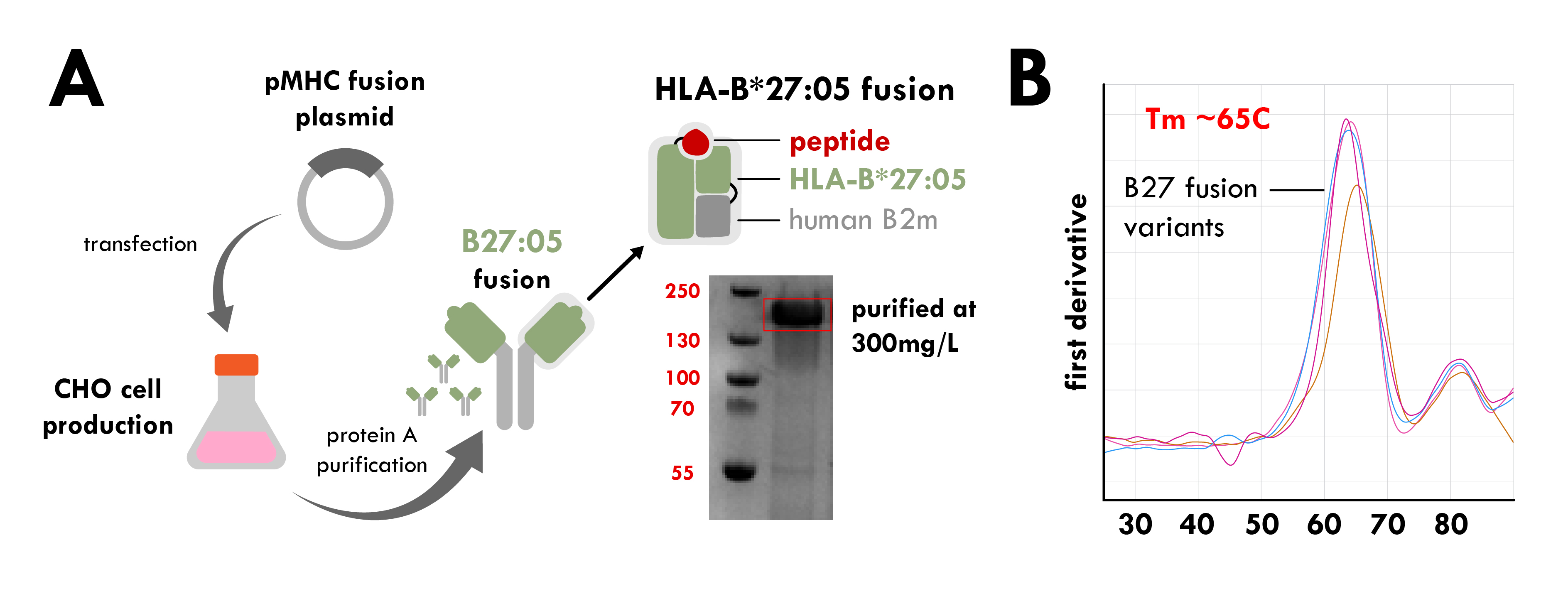Session Information
Date: Monday, October 27, 2025
Title: Abstracts: T Cell Biology & Targets in Autoimmune & Inflammatory Disease (0885–0890)
Session Type: Abstract Session
Session Time: 10:15AM-10:30AM
Background/Purpose: Ankylosing spondylitis (AS), a chronic autoimmune disease strongly associated with HLA-B27:05, is currently managed with therapies that broadly suppress inflammation instead of targeting disease-driving immune cells. This limitation highlights the potential of emerging selective T cell depletion strategies such as those using anti-TRBV9 antibodies, which have recently demonstrated clinical promise. Here, we present a novel therapeutic approach utilizing engineered peptide–MHC (pMHC) fusion proteins designed to selectively deplete HLA-B27-restricted, autoreactive T cells in AS. These pMHC fusion molecules are optimized for stability and TCR affinity, offering a new avenue for antigen-specific immune modulation.
Methods: We engineered B27:05 fusion proteins presenting cross-reactive peptides identified from AS+ patient synovial TCRs. Using high-throughput protein screening, we identified mutations that enhance the stability of HLA-B27:05 and globally enhanced engagement of disease-associated T cells . Candidate pMHC fusion molecule were conjugated to select payloads to enable targeted cell killing. Selective T cell depletion was tested using T cell lines transduced with one of 50+ AS-associated or control TCRs. Additional evaluation was performed in vitro on patient PBMCs to evaluate drug efficacy and toxicity.
Results: Lead pMHC-Fc candidates demonstrated high expression (≥100 mg/L), thermal stability (Tm ≥ 60°C), and strong binding to ≥70% of patient-derived TCRs. MMAE-conjugated pMHC-Fc constructs selectively eliminated >80% of AS-specific T cell lines with low off-target toxicity. In primary human cells, pMHC-Fc-MMAE treatment resulted in dose-dependent depletion of CD8+ T cells based on antigen-reactivity, displaying no notable toxicity beyond on-target autoreactive T cells.
Conclusion: We demonstrate the first functional application of soluble, engineered HLA-B27:05 fusion molecules to selectively deplete autoreactive T cells in AS. This precision platform addresses a critical unmet need by targeting the root cause of inflammation without broad immunosuppression. These findings support the advancement of pMHC-based biologics as a novel, disease-modifying therapeutic class for AS and other HLA-associated autoimmune diseases.
 Production and biophysical characterization of B27:05 fusion proteins: (A) Schematic of the production pipeline: pMHC fusion constructs encoding HLA-B*27:05, beta-2-microglobulin, and a disease-relevant peptide are transfected into CHO cells, and purified via Protein A affinity chromatography, yielding expression levels of ~300 mg/L. (B) Thermal shift assay of purified B27:05 fusion proteins demonstrates high thermal stability, with melting temperatures (Tm) averaging 65°C across variants.
Production and biophysical characterization of B27:05 fusion proteins: (A) Schematic of the production pipeline: pMHC fusion constructs encoding HLA-B*27:05, beta-2-microglobulin, and a disease-relevant peptide are transfected into CHO cells, and purified via Protein A affinity chromatography, yielding expression levels of ~300 mg/L. (B) Thermal shift assay of purified B27:05 fusion proteins demonstrates high thermal stability, with melting temperatures (Tm) averaging 65°C across variants.
.jpg) Specific depletion of AS-relevant T cells using B27:05 drug conjugates: A cytotoxic payload conjugated B27:05 was evaluated across a panel of 50+ TCR+ cell lines expressing either AS-relevant TCRs (green) or non-AS-related off-target TCRs restricted to A02 (blue), B27 (light green), C06 (red), or MHC class II alleles (gray). Following 72-hour treatment at 4 nM, selective depletion of HLA-B27-restricted TCR clones from AS+ patients was observed, with minimal off-target cytotoxicity across unrelated clones.
Specific depletion of AS-relevant T cells using B27:05 drug conjugates: A cytotoxic payload conjugated B27:05 was evaluated across a panel of 50+ TCR+ cell lines expressing either AS-relevant TCRs (green) or non-AS-related off-target TCRs restricted to A02 (blue), B27 (light green), C06 (red), or MHC class II alleles (gray). Following 72-hour treatment at 4 nM, selective depletion of HLA-B27-restricted TCR clones from AS+ patients was observed, with minimal off-target cytotoxicity across unrelated clones.
.jpg) Selective cytotoxicity of pMHC fusion in primary human PBMCs: Treatment of antigen-specific PBMC cultures with pMHC-drug conjugate demonstrated potent depletion of antigen-reactive T-cells (EC50 = 230 pM) while sparing other T cell populations. This validates the ex vivo selectivity and potency of the pMHC fusion platform in physiologically relevant immune cell mixtures.
Selective cytotoxicity of pMHC fusion in primary human PBMCs: Treatment of antigen-specific PBMC cultures with pMHC-drug conjugate demonstrated potent depletion of antigen-reactive T-cells (EC50 = 230 pM) while sparing other T cell populations. This validates the ex vivo selectivity and potency of the pMHC fusion platform in physiologically relevant immune cell mixtures.
To cite this abstract in AMA style:
Holec P, Reitars M, Singh N, Larsen I. A First-in-Class Biologic Selectively Targeting HLA-B27-Reactive T Cells in Ankylosing Spondylitis [abstract]. Arthritis Rheumatol. 2025; 77 (suppl 9). https://acrabstracts.org/abstract/a-first-in-class-biologic-selectively-targeting-hla-b27-reactive-t-cells-in-ankylosing-spondylitis/. Accessed .« Back to ACR Convergence 2025
ACR Meeting Abstracts - https://acrabstracts.org/abstract/a-first-in-class-biologic-selectively-targeting-hla-b27-reactive-t-cells-in-ankylosing-spondylitis/
